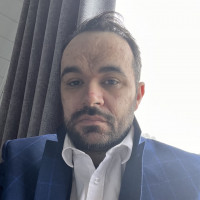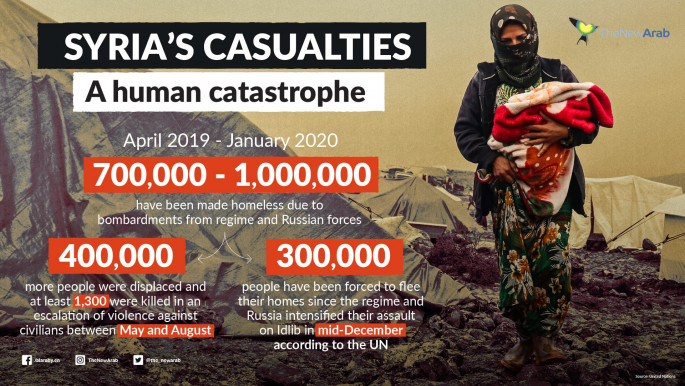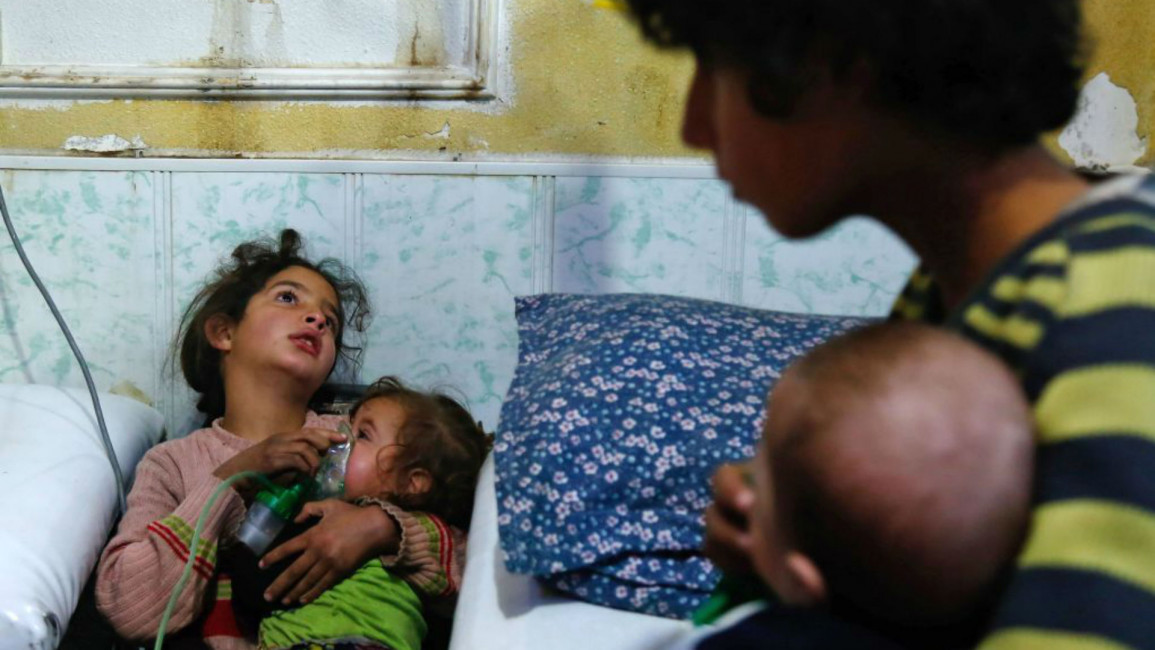
For Syrian chemical attack victims, OPCW report blaming Assad is too little, too late
The OPCW is an agency of the UN, and the report comes after the body was granted new powers by a UN Resolution to essentially identify those responsible for using chemical weapons in Syria.
Though the report will be released close to the anniversaries of large-scale chemical weapons atrocities, such as the sarin attack on Khan Sheikhoun in 2017, and the chlorine attack on Douma in 2018, it will only focus on chemical attacks on the village of al-Latimah in 2017.
The report will also include an interactive mapping tool, demonstrating with definitive proof that Assad is to blame for 98 percent of chemical attacks, including all of the large-scale ones, with IS responsible for the rest.
Of course this report ought to be welcomed - it could lead to further sanctions on Assad, key officials, and elements of his regime, but also because it's the first time that any official body has definitively attempted to counter the Russian-led propaganda that sought to exculpate Assad for these atrocities.
But for those who have observed the sheer horror unleashed by Assad-Iran-Russia over the past nine years, this action by the UN and OPCW is sadly too little, and too late - one might say it's almost seven years too late.
For it was seven years ago when Assad first used sarin gas on a large scale on then-rebel-held Ghouta, murdering at least 1,429 innocent people. Before the bodies were even cold, Russia's propaganda machine spun into action.
 |
These reports are not telling us what we did not know |  |
This included both official Kremlin-backed forces such as RT, and unofficial journalists, intellectuals and writers of both the far-right and far-left who choose to spin the Russian line claiming there was evidence proving Assad's innocence - no such evidence never emerged.
The atrocity at Ghouta was the moment many Syrians believed the world would intervene to protect them and aid their war of liberation against Assad and Iran. Instead, it led to the obscenity that was the Kerry-Lavrov deal, allowing Assad to get rid of some of his chemical weapons supplies, while effectively green-lighting his "conventional" war of extermination. It was a deal that formally allowed a murderer to get rid of some of his murder weapons.
Though Obama hailed the deal as a means to at least stop Assad using chemical weapons, and Assad-Iran-Russia apologists despicably hailed it as victory for "peace", Assad has used chemical weapons hundreds of times since then, including in Khan Sheikhun and Douma.
 |
|
| [Click to enlarge] |
For every chemical attack, Russia and its various mouthpieces were there to, at worst, blame the rebels or even the White Helmets for "faking" and "staging" chemical attacks, or, at best, to obscure the attacks to the point that people, whether the general public or those in power, were left confused as to who was to blame.
In this era of post-truth, Russia has excelled at shaping and navigating narratives on multiple different levels, turning the term "mainstream media" into a dirty word, and often filling the vacuum with pro-Kremlin "alternative media".
But the greatest outcome of Russian propaganda on behalf of Assad was not to get people to necessarily believe in the outlandish (though many did), but to appeal to the banal - to play to the ignorance and prejudices of the world when it came to Syria, while erasing or obfuscating Syrian voices telling the truth about their own victimhood and struggle.
 |
It's the first time that any official body has definitively attempted to counter Russian-led propaganda that sought to exculpate Assad |  |
This was crude but visceral propaganda – the Syrian rebels cast as "extremist terrorists" and Assad cast as a "victim of US regime change". In the shadow of the Iraq war, with its combination of opposition to "meddling in the Middle East" and Islamophobic tropes, it was easy for Russia to peddle such propaganda, and cash in on their power over popular consciousness.
It's impossible to assess how successful Russia's propaganda campaigns have been in obscuring the realities of the Syrian war, but in recent years aspects of it have crept into the mainstream, both in the media, or the mouths of politicians.
Even the UN has on numerous occasions abandoned "neutrality" (no international body should be "neutral" when one force is carrying out genocide), in order to directly cooperate with Assad.
These things establish normalcy for forces that were, and are carrying atrocities that amount to the crime of genocide. Normalising Assad's regime has relied on the obfuscation and denialism of his worst crimes, including his chemical weapons attacks.
Read more: UAE coronavirus aid to Syrians shouldn't mean rehabilitating Assad
In other words, the OPCW and the consequent Investigation and Identification Team, or IIT, ought to have been created years ago. If such a body had existed - a body with the resources to definitively counter Russian propaganda on Syria - it's possible that the war of narratives would have been won by those who support the rebellion, and who have recognised Assad's war as a genocidal project.
Chemical weapons have been a particularly cruel and brutal element of Assad's arsenal of terror, but the vast majority of his terror has been carried out by "conventional" means, using bombs, missiles and bullets. And even these "conventional" atrocities have been consistently contested by Russia and its attack dogs.
This is another crucial point: these reports are not telling us what we did not know. We know that Assad has carried out all the large-scale chemical weapons atrocities in Syria - there has been a vast body evidence for it, including that which convinced the US to undertake its exceptionally small, counter-intuitive punitive strikes following the Douma attacks.
 |
Chemical weapons have been a particularly cruel and brutal element of Assad's arsenal of terror |  |
At certain points, including on this very day, the UN has given weight to this denialism, such as by refusing to directly blame Russia for the deliberate targeting of hospitals in Syria, despite vast evidence it did.
This is just how steep Syria's uphill struggle has been. It's of no surprise then that a body such as the IIT has only now - at a time when most of Syria has been conquered by Assad-Iran-Russia - been allowed to function.
Alas, for the immediate future, nothing much looks set to change. Despite flickers of hope, Russia's propaganda poison has set in, for now.
But times change, and paradigms do shift. The best we can hope for, is that the OPCW report and other resources give the Syrian people future ammunition when the moment of reckoning for Assad-Iran-Russia and all its mouthpieces finally comes.
Sam Hamad is an independent Scottish-Egyptian activist and writer.
Join the conversation @The_NewArab
Opinions expressed in this article remain those of the author and do not necessarily represent those of The New Arab, its editorial board or staff.




